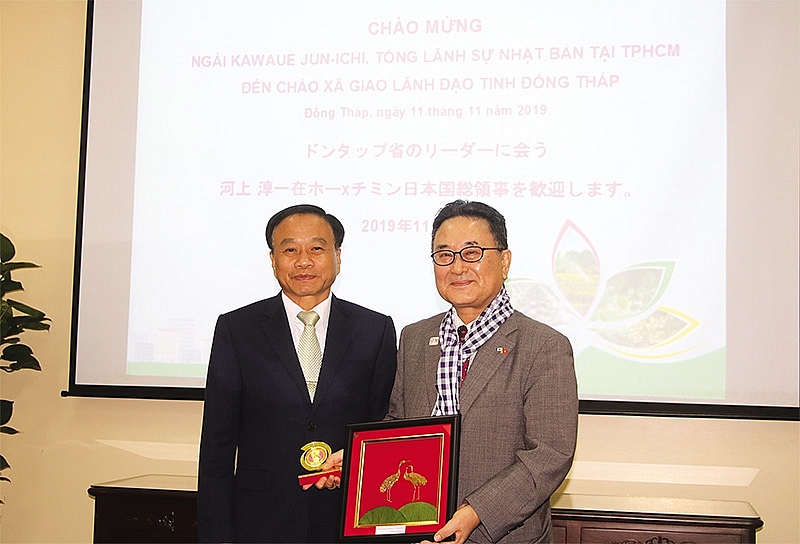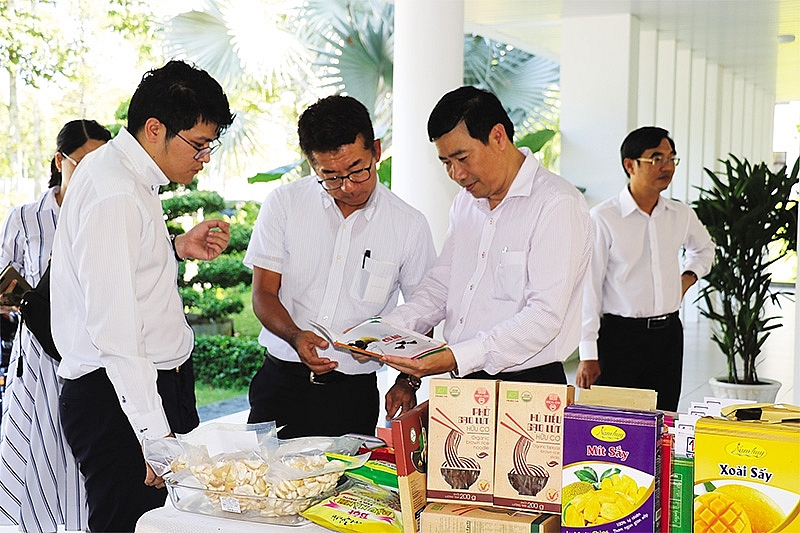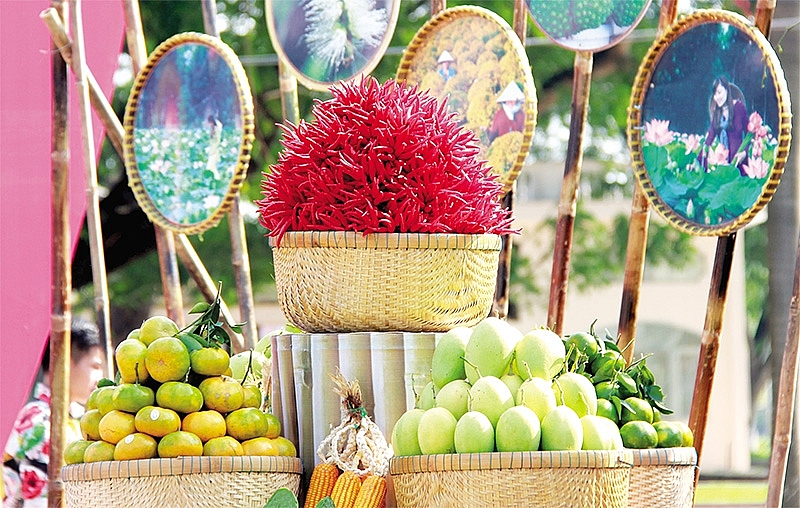Dong Thap’s sustainable agriculture
 |
| Japanese consul-general in Ho Chi Minh City Kawaue Junichi (right) with Chairman of Dong Thap People’s Committee Nguyen Van Duong |
Setting agriculture up as one of the pillars for economic development, Dong Thap is pushing agricultural restructuring gearing towards higher added value and sustainability.
The province’s agriculture has been gradually transforming towards a commodity-based production model in which modern science and technology processes are applied into production, helping to cut down production costs and improve crop yield and quality, closely linking to the sector’s value chain.
As for rice, increased mechanisation and the application of technology into production, besides deployment of best demonstration models, have contributed towards saving on production costs and constantly improving farmer incomes.
Along with that, Dong Thap has seen an ever-increasing seafood production output, with the seafood sector’s total production value jumping 12 per cent this year against the previous year, equal to VND1.268 trillion ($55 million).
The province is now home to nearly 30,000 hectares of fruit trees and has succeeded in forming specialised fruit tree areas that have reached VietGAP standards. Many types of local specialty fruits have made forays into markets around the world, such as mangos that have made a presence in Japan, the United States, Australia, South Korea, and New Zealand.
One particular highlight in Dong Thap’s agriculture is that local farmers have been shifting production from traditional small-scale to a commodity-based production model with increased levels of automation, changing their mindset from creating agricultural production into creating an agricultural economy.
When it comes to notable changes in Dong Thap in recent years, it is impossible to neglect distinct co-operation models initiated by Le Minh Hoan, Secretary of Dong Thap Party Committee. Today, the province is home to 85 such models attracting more than 4,000 members, mostly local farmers. Many models have ultimately grown into agricultural service co-operatives.
 |
| Dong Thap People’s Committee Deputy Chairman Pham Thien Nghia (right) presenting products to Takahashi Nobuto, chairman of Business Frontier |
Accelerating co-operation
As the province’s agricultural production has yet to commensurate with local actual potential, Dong Thap regards promoting investment co-operation with developed countries, including Japan, one of the strategic steps to gear the province’s agriculture towards more sustainable growth.
In recent years, the province has emerged as one of delta localities taking the lead in foreign investment attraction, particularly in the agriculture sphere. Agriculture alone has courted 14 out of a total 22 operating foreign-invested projects in the region, valued at $172 million in total committed capital.
Such investors come from the US, Australia, France, Japan, Singapore, Thailand, and China, to name but a few.
Two projects are registered by Japanese investors – one on establishing the Dong Thap branch of Ajinomoto Vietnam’s storehouse base for product consumption, and a second related to a rice cracker production plant based in Truong Xuan Industrial Cluster in the province’s Thap Muoi district.
Dong Thap is one of two Vietnamese localities in which the Ministry of Agriculture and Rural Development and Japan’s Ibaraki prefecture have signed co-operative agreements on strengthening co-operation in the sector.
Particularly, the two localities have exchanged delegations of officials and specialists to attend diverse research programmes and skill training courses, as well as partaken in wide-ranging research, assessment, and presentation activities on the agricultural potential of both sides.
In a recent visit to Japan in September, Dong Thap Party Secretary Hoan – and Pham Thien Nghia, Deputy Chairman of the province’s People’s Committee – met with the governor of Japan’s Mie prefecture and leaders from major Japanese investors and business groups engaging in studying and processing packed food all over Japan.
According to Eikei Suzuki, Governor of Mie prefecture, the visit of Dong Thap leaders unleashed multiple opportunities for mutual co-operation across the board, such as in economic development, cultural and educational exchanges, and trade promotion, among others.
 |
| Many kinds of Dong Thap fruits have been exported to foreign markets |
Perfecting products
Around the same time, a Japanese business mission led by Takahashi Nobuto, chairman of Business Frontier, visited Dong Thap searching for opportunities to promote exports of Dong Thap’s key agricultural products to Japan. A wide assortment of local agricultural produce such as rice-based items, tra fish, fruit, lotus, sweet potatoes, and taro was presented to businesses of the Japanese mission.
Striving for betterment, Dong Thap is looking to receive useful consultations from Japanese peers on product packaging and how to best preserve agricultural items to meet strict market demands.
Hirai Shinji, chief representative of the Japan External Trade Organization based in Ho Chi Minh City, recently met with Chairman of Dong Thap People’s Committee Nguyen Van Duong to become well-informed about the province’s development situation, in order to later convey information to Japanese businesses seeking investment opportunities in Dong Thap.
In a recent meeting with the province’s leaders, Kawaue Junichi, Japanese general consul in Ho Chi Minh City, expressed intentions to bridge Japanese investors to Dong Thap in their quest for business opportunities, particularly in agriculture and labour co-operation.
According to Duong, Dong Thap wants more Japanese funding into priority fields, including high-tech agriculture, vegetable and fruit processing, and mechanical manufacturing serving agriculture. To court more such funding, particularly in the form of foreign direct investment, the Dong Thap leader said that the province is pushing up administrative procedural reform, helping businesses save time and costs, and remaining consistent with the slogan that “the state is walking in step with investors and businesses.”
As part of the delta region, Dong Thap accommodates 12 district-level administrative units. Of those, five belong to the list of locations with especially difficult conditions for socio-economic development, and five appear in the list of locations with difficult conditions for development.
Investment projects in these areas will be entitled to enormous incentives in taxes and land rental as per current law.
What the stars mean:
★ Poor ★ ★ Promising ★★★ Good ★★★★ Very good ★★★★★ Exceptional
Related Contents
Latest News
More News
- Haiphong gains new growth impetus from strategic planning and integrated infrastructure (February 27, 2026 | 16:40)
- Kurz Vietnam expands Gia Lai factory (February 27, 2026 | 16:37)
- SK Innovation-led consortium wins $2.3 billion LNG project in Nghe An (February 25, 2026 | 07:56)
- THACO opens $70 million manufacturing complex in Danang (February 25, 2026 | 07:54)
- Phu Quoc International Airport expansion approved to meet rising demand (February 24, 2026 | 10:00)
- Bac Giang International Logistics Centre faces land clearance barrier (February 24, 2026 | 08:00)
- Bright prospects abound in European investment (February 19, 2026 | 20:27)
- Internal strengths attest to commitment to progress (February 19, 2026 | 20:13)
- Vietnam, New Zealand seek level-up in ties (February 19, 2026 | 18:06)
- Untapped potential in relations with Indonesia (February 19, 2026 | 17:56)

 Tag:
Tag:




















 Mobile Version
Mobile Version